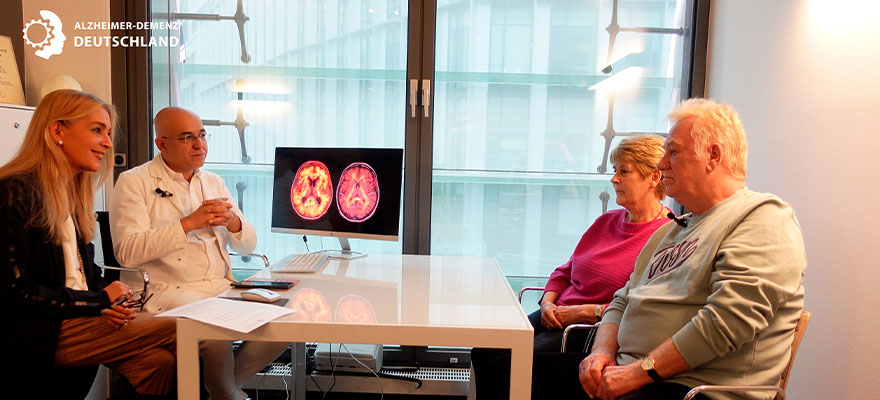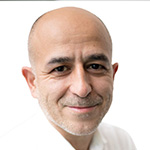Almost three years symptom-free thanks to TPS: Interview in my practice with Mr. and Mrs. Vieregge
Jochen and Erika Vieregge tell “Alzheimer Deutschland” about their life with Alzheimer’s and TPS
Last week, Katja C. Schmidt, initiator and editor-in-chief of the online information portal “Alzheimer Deutschland”, interviewed my patient Jochen Vieregge, his wife Erika and me to document how Jochen is doing today thanks to TPS, almost three years after starting treatment. Katja C. Schmidt, who is herself the developer of a different form of physical treatment based on electromagnetism and therefore immediately recognized the potential of TPS, has accompanied this form of shock wave therapy since it was first used in practice and maintains numerous personal contacts with those affected over the long-term course of the therapy: “I’m delighted with the success of the treatment, but I’m not surprised,” she says about the case of Jochen Vieregge: “The longer Transcranial Pulse Stimulation is used in clinics and practices and the more people are treated with this increasingly extensively researched neurostimulation procedure, the more it becomes apparent that the quality of life of patients and thus also their relatives can also increase significantly in the long term and the progression of the disease comes to a standstill. Incidentally, this can also be seen in MRI scans, which we will soon be presenting publicly for the first time.”
The first major television report from my practice made TPS known in 2021
The fact that Alzheimer’s research is not just about drugs, but that a physical neurostimulation procedure called Transcranial Pulse Stimulation (TPS) also holds a significant step towards the future of effective Alzheimer’s therapies, was first made known to many people in November 2021 through several reports by the television channel RTL, which the Hamburg editorial team had filmed about Jochen and Erika Vieregge and me.
The RTL editorial team was the first major media outlet to become aware of the Transcranial Pulse Stimulation (TPS) shockwave procedure and, after extensive research, filmed a report with Alzheimer’s patient Jochen Vieregge, now 73 years old. The agile Hamburg resident was diagnosed with clinical Alzheimer’s dementia at the beginning of 2019 following an MRI, cerebrospinal fluid examination and corresponding tests. Initially, Jochen Vieregge was given medication, none of which he could tolerate and all of which were discontinued. He is still not taking any medication today; in his case, TPS is a one-off therapy.
Thanks to their acquaintance with me, the Vieregges fortunately found out about the new TPS Alzheimer’s therapy early on and didn’t hesitate: “We had known the professor for some time and trusted him completely,” says wife Erika Vieregge: “Thank God we decided on TPS straight away, because otherwise we certainly wouldn’t be able to live the life we do today.”
At the beginning of 2021, Jochen Vieregge received the first six initial treatments with Transcranial Pulse Stimulation (TPS) and immediately responded to the therapy. RTL showed how well TPS worked on the evening news program “RTL AKTUELL” and helped TPS to become better known, which subsequently proved beneficial for many patients.
Almost three years of TPS: a new interview confirms the lasting effect of the shockwave procedure
How are Jochen Vieregge and his condition doing today, almost two years after the RTL documentary and almost three years after starting treatment with TPS? In an interview at Prof. Citak’s practice in Hamburg last week, the Vieregge couple once again answered these questions.
Katja C. Schmidt sat opposite a cheerful, relaxed couple. Jochen Vieregge’s condition, if you can even call it that, is a far cry from what is generally thought of as moderate Alzheimer’s dementia. If you didn’t know it, you would hardly assume that the man, who tells his story in the finest Hamburger Schnack, suffers from dementia: Thanks to regular, individual booster treatments with TPS, the Vieregges lead an active, fulfilling life with their whole family, circle of friends and many social contacts. He still goes shopping himself, drives his car and lives the normal life of a pensioner.
However, the most important thing for the former warehouse manager at the Port of Hamburg and his wife Erika is that he can participate openly and fully in social life. He is dedicated to life and infinitely grateful to the TPS.
Non-invasive brain stimulation procedures: Increasingly recognized with prospects for further indications
The Vieregges cannot understand the criticism and prejudices against this breakthrough in the treatment of neurodegenerative diseases, which still receives far too little attention: “We can only advise everyone affected: Just do it,” they both said as if from the same mouth.
As an expert in regenerative medicine and my many years of research at Hannover Medical School (MHH), I can see the complexity of the topic: the new non-invasive brain stimulation methods, or NIBS for short, naturally upset people’s previous world view. When for decades there has only been talk of the search for medication and suddenly physics comes into play, which is not only true for TPS, people, and this also applies to experts, first have to familiarize themselves with it. It is quite normal for there to be skepticism at first, but TPS will become established over time because it works and is absolutely safe. More and more colleagues are recognizing this. Moreover, research has been going on for decades and what science has now discovered about the mechanisms of action of the low-energy shock waves of TPS shows that we are only at the beginning of the possibilities in the treatment of numerous diseases. There is much more to come.
RTL stays on the ball: Interview with Prof. Wüllner from the University of Bonn on World Alzheimer’s Day 2023
On the last World Alzheimer’s Day on September 21, 2023, RTL once again reported on “RTL AKTUELL” about Transcranial Pulse Stimulation (TPS) as a currently promising Alzheimer’s therapy. In the interview this time: Prof. Dr. med. Ullrich Wüllner, University Hospital Bonn, Director of the Clinic for Neurodegenerative Diseases. He also confirms what the case of Jochen Vieregge exemplifies: “We actually observe a stable course in two thirds of our patients. This means that their mental performance, measured in the neurological test, does not deteriorate!”” (See: https://www.rtl.de/videos/neue-therapien-fuer-alzheimer-patienten-650bd3e0ab000afd800cf564.html )
Reports and interview with Jochen Vieregge
It is worth watching both the RTL report from 2021 and the new interview from October 19, 2023 to be able to compare:
Click here for the RTL report from November 2021:
Here you can see the new interview from October 2023 with subtitles in German:
You are currently viewing a placeholder content from Vimeo. To access the actual content, click the button below. Please note that doing so will share data with third-party providers.


